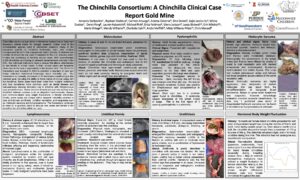Amanda Darbyshire, Raphael Malbrue, Carmen Arsuaga, Andrea Osborne, Gina Dobek, Jiajie Jessica Xu, Misha Dunbar, Derek Fong, Lauren Habenicht, Michael Fink, Erica Feldman, Glenn Jackson, Leeza Birdwell, Erin Mitchell, Marie Ortega, Wendy Williams, Charlette Cain, Andie Moffitt, Misty Williams-Fritze, Chris Manuel. The Chinchilla Consortium: A Chinchilla Clinical Case Report Gold Mine.
Chinchillas serve a unique niche in biomedical research as an important laboratory animal model for otologic research. Unlike most of the domesticated species used in biomedical research, many of the resources specific to chinchilla husbandry, care, and medical management lie within the unorganized public domain. A relatively low number of chinchillas are used in research in the U.S. annually which hinders the monitoring of trending clinical cases. With approximately 2,200 chinchillas contributing to research advancements annually in the U.S., few individual institutions have a census that allows veterinarians to see trends in clinical cases. Further, unique cases are frequently siloed due to the lack of applicability to the broader field.

The Chinchilla Consortium was founded in 2020 to establish a standard of care and bridge individual institutional knowledge about chinchilla use. The Consortium is currently comprised of 20 institutions contributing to this common goal, including the ability to follow trends of clinical cases with low incidence. Some cases have been noted from multiple institutions and thus considered more common, such as dental disease and subcutaneous abscess formation due to infection with Streptococcus equi zooepidemicus. Some common threads are just now starting to be identified between colonies such as idiopathic cardiovascular disease and hormone-related body weight fluctuations in female chinchillas. Finally, some cases are unique within research chinchilla colonies to date and include urolithiasis, umbilical herniation, and neoplasias such as histiocytic sarcoma and lymphosarcoma. The Consortium continues to meet on a quarterly basis to discuss new cases and trends to the benefit of the chinchillas within our care.
Poster presentation at the 2023 AALAS National Meeting in Salt Lake City, UT, October 22-26.

